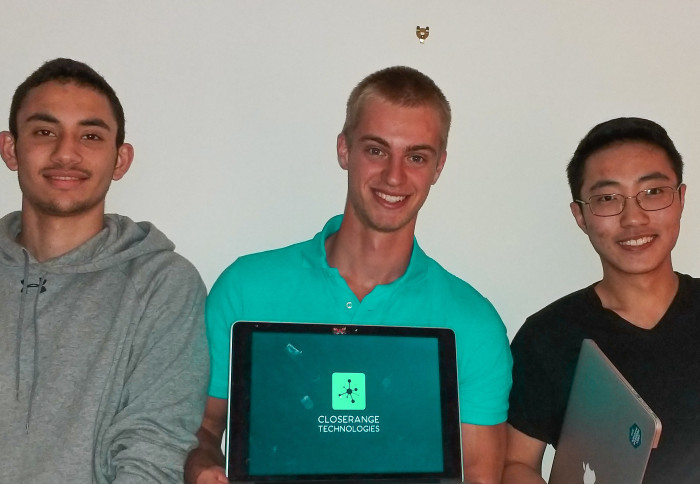Student entrepreneur talks about working on a start-up during a pandemic

Jaafar, Leo and Shuler
Mechanical Engineering student Leo, co-founder of the start-up CloseRange Technologies ltd, talks about his entrepreneurship experiences.
Looking to be of help during the COVID-19 pandemic, a team of Imperial students were brought together in March by a project for a contact tracing application which they pitched to governments. Building upon this experience, they are now expanding their efforts into developing more software and hardware aimed to reanimate and improve a post-COVID society.
Who is part of your team, and what skills do they each bring?
We had some brilliant minds helping us, but the core members of our team are Jaafar Rammal, Shuler Xu and Leo Michel-Grosjean.
Leo (third year Mechanical Engineering student) co-ordinates the team and manages the projects. He also liaises with customers, suppliers and collaborators to ensure the operations of the business flow.
Jaafar (third year Electronic and Information Engineering student) leads the software architecture design and development. He has competed in, and won numerous Hackathons.
Shuler (fifth year medic, researcher in the Interventional Systems Neuroscience group at Imperial) leads software architecture implementation development.
What is your latest idea about and what it can be used for?
We are working on bridging the gap between the pen and paper and your screen. We have begun to develop a more efficient, more eco-friendly, more entertaining way of interacting with paper, PDFss and other documents. This technology will include augmented reality which will hypothetically allow you to write on documents on your phone screen by simply performing the writing gesture on any surface; whether that is the seat in front of you in the bus, a wall, a table; without using paper.
We have also been working on developing authentication architecture that will be able to certify the annotation or signature. We believe the key markets for this app will be anyone who has to fill in and sign many documents as this app will improve the efficiency and authenticity of the process.
Have you always wanted to be an entrepreneur or to work for yourself? What inspired you to start?
Growing up in Shanghai for the first 18 years of my life, I have witnessed an incredible city develop but have also experienced the effects of pollution, which have driven an innate desire to contribute to a more sustainable society. As I grew up, I noticed that the individuals in this world driving the most tangible change seemed to be ‘entrepreneurs’ although this has never been a target in itself and working for a corporately responsible company could also contribute greatly.
What are the biggest barriers and difficulties when trying to get a start-up off the ground?
Trying to develop a novel technology during our revision period was very difficult because of the lack of time. Time management is crucial and involves really thinking about efficient procedures and tasks for the team before carrying them out, to ensure each person is at the task they are best at and that there are no overlaps.
Another difficulty we faced was in liaising with potential customers and collaborators. Business is a tough world and we learnt that the hard way. The importance is to persevere and keep moving forward without dwelling on any events, meetings, calls, conferences, pitches whether they were fantastic or poor as the outcome will differ to expectations. An important lesson gained from this experience is that it is important to communicate contractually as well as verbally. Use templates offered by the UK government to create your own NDA or other contracts that you need as they are very important in communicating but also in protecting you in case of problems.
What advice would you give to other Engineering students who want to be entrepreneurs?
Engage in projects that are truly motivating for you, no matter what that might be, as ‘work’ will feel a lot less like ‘work’ when you believe in it. Mornings, afternoons and nights facing a computer and on phone calls (in our case) can get extremely difficult otherwise. Entrepreneurship is no science or art; its work, sweat and tears into projects that you enjoy, that motivate you and that you truly believe will make a positive impact.
Article text (excluding photos or graphics) © Imperial College London.
Photos and graphics subject to third party copyright used with permission or © Imperial College London.
Reporter
Press Office
Communications and Public Affairs
- Email: press.office@imperial.ac.uk
